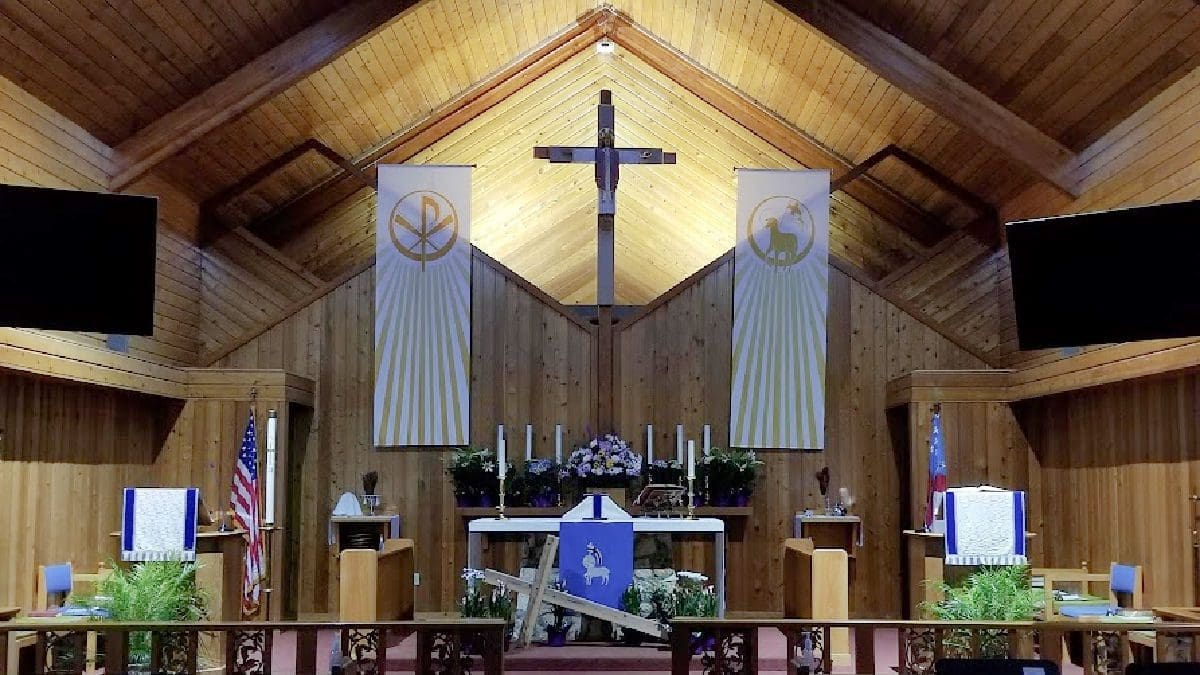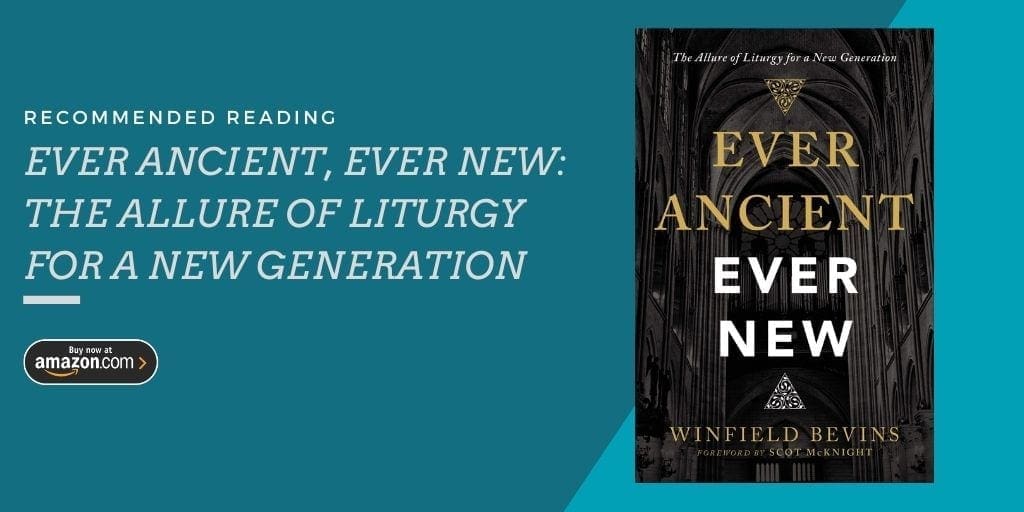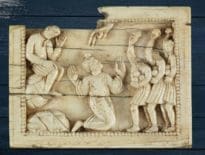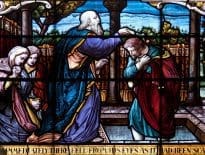First, let me say that I’m grateful for my many years worshiping and serving in the non-denominational, charismatic church. But I think I’ve found home in the Episcopal Church.
Everywhere I turn, I keep finding such incredible depth, tradition, and beauty. And I feel like I’ve stumbled into a practice that is everything I’ve expected the Christian faith to be. And just when I think I’ve got it figured out, I have another experience that makes me feel like I’ve only scratched the surface of what this incredible church has to offer.
Is it the perfect church? Absolutely not. After all people are still involved, so there’s no chance for it to be perfect. But I also see a church eager to embrace it’s imperfections, and ready to come to the table and talk about it. But more on that in a bit.
And while this may not be an exhaustive list of reasons, here are six big things I’ve discovered (and love) about the Episcopal Church.
The Beautiful Rhythm of the Liturgy
This is one thing that many modern, more contemporary churches tend to be critical of. But the rhythm in the routines of the liturgy quickly build a sort of spiritual muscle memory. Especially when you realize the meaning behind every action we take during liturgical worship, like:
- Even the building itself plays a role. Typically, congregants are facing East during worship. The reason is that the early Christian church believed that Jesus would return with the rising of the Sun, which comes in the East. So worship happens with the people facing that direction in anticipation of the returning Christ.
- The reading of the Gospel is often done from the center of the church (among the people), rather than from the pulpit. The reason is that the Gospel belongs to the people, so it’s read among the people.
- Preparation of Communion at the altar is done by a Deacon, representing the work of the first deacons in the book of Acts who had the job of preparing food (the table) for the people.
- Just to name a few…
From the moment you walk in the doors to (and including how) you leave the sanctuary is intentional, with many practices going back to how the first and second century church worshiped.
Meanwhile, the repetition of these worship practice begins to feel like a heartbeat, pumping (spiritual) life through every bit of your body, soul, and spirit.
And this rhythm not only occurs within each individual worship service, but also throughout the year in the repetition of the liturgical calendar. The year itself becomes a sort of reenactment of the life, ministry, death, and resurrection of Jesus, and the birth of the Church. Thump-thump. Like a heartbeat.
Just Give Me Jesus
I my previous church experience, much of what moved people was emotion. And I’m not saying that like it’s necessarily a bad thing. But knowing that the church can be somewhat emotionally driven, it can be more susceptible to being emotionally charged in other situations. Think of what the entire year of 2020 was like with COVID shutdowns, racial unrest, and political divisions. It was a literal emotion overdose for all of us in a lot of ways. And we’d be silly to think that doesn’t creep into the church (and it did).
But then when I experienced the liturgy in the Episcopal Church, there was none of that. Sure, worship (music) wasn’t as flashy or upbeat. But there was always great grounding and peace when much of the talking comes from the simple act of Scripture reading. We would read an Old Testament passage, a Psalm, a New Testament passage, and a Gospel passage.
Following the readings would be a short sermon based on one (or more) of the readings. So no talk about whatever the emotional issue of the day is. Just an unpacking of the Word itself. Less room for emotion.
Just more of Jesus.
Rich Tradition and History
Is the American Church today what Jesus would have intended?
That’s a big question that I’ve wrestled with for several years. And it sometimes felt like even asking that question in most of the church circles I’m more familiar was frowned upon. Like, how could I even ask that question? But more on that in a moment.
Listen… I’m not necessarily knocking rock-band style worship performances, smoke machines, hour-long sermons designed to make people feel better about themselves, and so many other things I’ve been a part of for many years. But at some point, we really just have to wonder what church is supposed to look like.
And that’s one thing I’ve found in the Episcopal Church (and I know is part of some other similar traditions) is that many of the practices go back to first and second century Christian practices. We even see Jesus in the Gospels going to “church” and participating in the reading of Holy Scriptures, a big part of the Liturgy of the Word. The more I learn about liturgical practices, the more I see an act of worship that goes back to practices that the first Christians would have done.
Even things like many of the collects (prayers) we recite are prayers written by incredible men and women of God hundreds of years ago. These beautiful and theologically rich prayers are part of some incredible traditions that connect us to the long history of our Christian faith.
Deep Thinking is Allowed Encouraged
One thing I’ve learned in my church “upbringing” is that one of the unspoken requirements for being successful in ministry was learning the right way do do and say everything. I always felt like I needed to learn all the right talking points so that I could minister in an acceptable way. And that’s where I’ve run into issues with asking questions about things like what church was intended to look like.
And often the answer for questions about faith in general is just, “the Bible says so.” But that just gets tricky, because the Bible isn’t written as a to-do guide for how to live life. Rather, it’s the story of a God who created us and pursues us for a relationship with Himself. So it’s not really even meant to answer every question about every situation that we might encounter.
Ultimately, this is a knock that the world has on the American Church these days, that it doesn’t allow free-thinking. For example, Christians can’t talk about (let alone agree with) something like evolution because “the Bible says.” We can’t have a legitimate discussion outside the church about certain topics. And if you question something inside the church, then you may just get labeled as not fit for ministry.
What I’ve found in the Episcopal Church is that not only is it okay to ask questions, but it’s encouraged. It’s okay to talk to someone and bring up different ideas or questions. Let’s sit down together and talk about it. Ultimately, we may finish the conversation and still not agree. And that’s okay! And whether we agree or not, let’s go worship together.
The result of this is a church with an incredible diversity of thought. Even politically, as an Independent, I sit in church with Republicans and Democrats and Libertarians and I’m sure other affiliations. We can talk about things and and still come together to worship the same God.
I feel like I’m in an environment with some incredibly deep thinkers, and my faith has grown leaps and bounds as a result. That makes my worship experience even more meaningful and rich as a result.
Everyone Is Welcome at the Table
With this whole thing about being able to ask questions and having diversity of thought, it inherently means that we won’t always agree. And that is absolutely okay! But it means that the church isn’t filled with people who look and act and believe exactly like I do.
I think the problem that we often run into is that even though we say everyone is welcome, we don’t always behave like it. As a result, we end up alienating people who don’t fit a certain mold. That means that some people will never feel welcome.
One of the most beautiful things that I see in my church is that we all, with all of our differences, come together at the same altar and receive Communion together. Each one of us wrestling with God in our own ways. But we all love and serve the same God, and are all welcome at the same Table.
It seems to me like this is more important than we realize. Because the truth of the matter is that every human is created by God, in His image. And every single one of us has fallen short of living up to something. Regardless, God wants a relationship with every one of us. And if he welcomes me with all of my junk to His Table, why wouldn’t He welcome someone else (just with different junk). That would go against His character.
I didn’t have to do anything or change who I am in order to be loved and accepted by God.
A little bonus perspective for this point… I’ve also been serving as a Lay Eucharistic Minister, serving the Cup on many Sunday mornings. And so far, few things have moved me as much as seeing the faces of all the people I help to receive Communion. Every single one in such different places in their journey with Christ. And it’s simply beautiful.
The Holy Spirit Is Alive and Active
In my more charismatic church days, services would often follow the lead of the Holy Spirit. We would start with worship, but if we’re really starting to feel it, the entire service could end up being just the worship team with maybe some prayer and altar call stuff mixed in (and never get a sermon). Regardless of how the service went, it was always important to “let the Spirit have His way.”
That kind of free-flowing experience seems to have become the cornerstone for that kind of church. And when people in those church experiences look at the liturgical worship with it’s readings, hymns, and pre-written prayers, they often question where the Holy Spirit is.
Part of it gets down to our understanding of the Holy Spirit, and how He works.
Without diving into a major pneumatology (study of the Holy Spirit) conversation, I can tell you that I see the Holy Spirit working in peoples’ lives in and out of church services. I do know that the Holy Spirit moves in all of us in many different ways. For some there is a major revelation during a Scripture reading or the sermon. For others, the Spirit may move someone through prayer times during the service. I’ve even seen people moved to tears while serving them the Cup during the Liturgy of the Table, obviously being touched by the Holy Spirit.
But more importantly, the Holy Spirit isn’t just for moving during church services. The Holy Spirit walks with us throughout the rest of our lives outside of the church building too. And in our parish at least, I see lots of people committed to doing life with the Holy Spirit alongside them.
The Holy Spirit is absolutely alive and active in the Episcopal Church.
Final Thoughts On Finding Home in the Episcopal Church
I could sit here and try to make all of the big technical arguments for (or against) any church tradition. And it’s not my heart to tear anything down. I have a great deal of respect for many great men and women of God who have been part of some life-changing ministry for countless others.
But ultimately, all I have is my testimony.
And all I know is that of all the time I’ve been in the church, the last (nearly) two years in the Episcopal Church has given me some of the sweetest, most precious moments I’ve ever experienced with the Lord. I’ve grown incredibly in my knowledge and understanding of the Word and in my connection with the tradition and history of the Christian Church. And I feel like I’m doing some of the best ministry work of my life right now.
I’m home now. Amen.






Dan, this was beautifully written! I don’t know much about the Episcopal church but will certainly investigate! Thank you!!
I just swapped emails with another writer friend who said they had a very similar experience and that this whole “finding home” thing resonated with her and her husband, because they could relate to all of what I wrote.
I’m really loving it, and pray that you have a good experience as you explore too!
Amen, amen. AMEN. Thank you, Dan. My husband and I ‘discovered’ the Washington National Cathedral just over a year ago. It’s online, we are old and getting older (and somewhat frail and getting frailer!!) and we, too, feel as though we’ve come home. And having served communion by intinction during most of my years in pastoral ministry, I TOTALLY understand how moved you are to serve it to all the crazy, beautiful members of your community.
That’s so awesome… finding home is always incredible to experience! And I’m currently in the middle of the (two-year) discernment process for ordination to the diaconate… and the thought of preparing the Eucharist at the altar just blows me away… can’t wait to get to that part!
Shalom Dan,
I am all about The Word and The Holy Spirit…JESUS, the word made flesh who gave us the gift of the Holy Spirit.. I do know we can’t put God in a box, He is all about the heart ♥️ and His ways are as deep calls to deep, I believe He shows and speaks to each of us where we are and what we are ready to receive…as we humbly come before Him and draw close to Him and adore Him… I have to say that I am very grateful for all He has done and continues to do for me and in the world and I know His timing is always perfect, but I am not home yet…I am glad you feel that way, but maybe it’s because of my life situation, but also I see so much evil and heartache in the world, I just can’t wait for Jesus to
Fulfill (every jot and tittle) and straighten everything out and return
To us so we can BEHOLD HIM….our BLESSED HOPE…Then I will be truly able to say “I am home” ♥️👩🏻🦰🙏🏻🙌🏼
Maranantha
I hear you about everything that’s going on in the world. I’m also reminded of Jesus’ prayer to the Father to not remove us from the world, but to protect us from the evil one. I think that this earth may be our “home” more than many of us are willing to accept, mainly because there is so much bad that we just want to be rid of it. But that’s where I feel called to be the light here that expels the darkness. And the more of us lights we can gather here and now, the more we can impact that in this world.